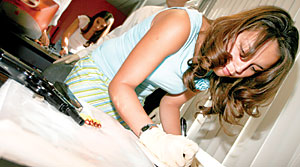 |
|
CLAIRE C. LAURENCE/Arizona Summer Wildcat
|
Lisett Huicochea, 17, processes a fake 9mm pistol during a mock crime scene competition that was held on campus Monday and Tuesday. The event was put on by members of the Tucson Police Department crime lab and included lectures and hands-on demonstrations for high school students from all over Tucson.
|
|
|
By Zach Colick
Arizona Daily Wildcat
Wednesday, July 13, 2005
Print this
CSI’s high school fans in Tucson are getting a taste of what a career in forensics is really about in a weeklong summer program on campus this week.
Local 11th and 12th graders will be introduced and exposed to forensic science in a weeklong summer camp spread across the UA campus in hopes of opening their eyes to a future career in the field.
The DNA Detectives camp, organized by the Division of Biotechnology in the UA’s Arizona Research Laboratories and the Flandrau Science Center, will offer the program to 22 to 24 students this year, along with eight teachers. The students will participate in mock crime scenes recreated from actual cases of murders, paternity cases and other DNA-based investigations, said Al Agellon, research and training coordinator for BIO Technology.
Agellon said a forensic scientist’s role is to speak on the evidence they have collected at a crime scene, during a trial, rather than to help solve the crime, and said he hopes the students will take something away from the camp so they can pursue a career in the field.
“Their role is a scientist and not a crime solver. The evidence is actually the crime solver,” said Agellon, adding that the glorification of the field in shows like CSI ruin what the field is actually all about with what Agellon called the “CSI effect.”
“There seems to be a lot of interest in this and it will be a great opportunity for them to see what forensic scientists do in real life,” he said.
The camp will also provide the opportunity for two low-income students to attend the camp by way of scholarships that are sponsored by the UA’s BIO5 Institute.
Scholarships make it possible for the students to discover career possibilities within the large field of forensic science such as law enforcement agencies, forensic laboratories, the judicial system and in scientific research, said Vicki Chandler, director of BIO5, in a press release.
“We are very excited to include two bright students in the DNA Detectives camp who would not otherwise have the means to participate,” Chandler said in the release.
The young DNA detectives will work in a university laboratory and in the Tucson Police Department Crime Laboratory, learning the same DNA analysis techniques that forensic scientists use to draw conclusions from evidence, Agellon said.
The students will also be introduced to a variety of forensic disciplines and technologies such as latent prints, ballistics, microscopy and chemistry, Agellon said.
The course concludes with a mock court trial in which students will have the opportunity to testify as forensic analysts, with the participating teachers at the students’ sides, said Agellon.
For teachers, the course will offer expertise and ideas for lab work they can introduce in their own classrooms.
Agellon said there will be opportunities for the students to interact with law enforcement officials, crime scene technicians, crime laboratory personnel and court officials to discover multiple career possibilities within law enforcement agencies, forensic laboratories, the judicial system and in scientific research.
“We hope they get some understanding of what really goes on in solving a crime in bringing perpetrators to justice,” Agellon said.
The weeklong camp will also offer field trips visits to the UA Biotechnology Facilities, the Tucson Police Department Crime Laboratory, the Arizona Superior Court in Pima County and the UA College of Law Courtroom.
For more information visit http://biotech.arl.arizona.edu/education/FORENSICS/index.php.
